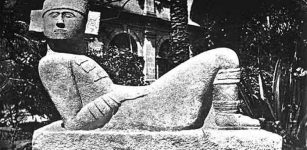Why Did First Printed Books Scare Ancient Scholars In Europe?
Ellen Lloyd - AncientPages.com - Johann Gutenberg’s brilliant printing press changed Europe’s history. People were excited when the first printed books started appearing in Europe. Thousands of titles were now available, and more and more people could buy previously rare and expensive books.
However, though Gutenberg’s printed press was appreciated by most, some considered the mass distribution of printed books dangerous. Several scholars were against the printing press. So, why did the first printed books scare scholars in Europe?
Left: Gutenberg's printing press was appreciated by many, but far from all. Right: Johannes Gutenberg (1400-1468), Public Domain
We should not forget that Johannes Gutenberg did not invent the printing press. He contributed to movable type mechanical printing technology in Europe in 1450. Chinese and Korean inventors produced printed books for centuries before Gutenberg was born. The world’s first known movable type printing was a Chinese invention.
Gutenberg adapted the technology for a Western market and turned it into a publishing empire.
On February 23, 1455, Europe’s first mass-produced book – the Gutenberg Bible – was printed with movable type in Mainz, Germany. The book was a Latin language Bible.
Gutenberg’s printing press helped to popularize books and the information they contained.
His invention revolutionized the distribution of knowledge by producing many accurate copies of a single work.
Scholars Believed That Too Much Knowledge Was Dangerous To Ordinary People
To many scholars, the easy distribution of knowledge was a problem. One scholar who spoke against Gutenberg’s printing press was Conrad Gessner (1516-1565), a Swiss physician, naturalist, bibliographer, and philologist.
Gessner was, in many ways, an outstanding scholar and wrote several books, but he certainly didn’t like the printing press. Gessner created a list of all books published with the help of Gutenberg’s printing press over 100 years, and it contained as many as 10,000 titles accessible to readers in Europe.
According to Gessner, this was shocking, absurd, and dangerous. Gessner’s argument against the printing press was that ordinary people could not handle so much knowledge.
William Caxton shows his printing press to King Edward IV. Credit: Prepressure
Gessner demanded that those in power in European countries enforce a law regulating the sales and distribution of books. He felt ordinary people should not have access to such many books. Gessner was not a person who hated books. On the contrary, according to a legend, he wished to spend his last day in a library, a place he loved, and at the time of his death, he had published 72 books and written 18 more unpublished manuscripts.
Gessner was not the only one who was annoyed with the printing press. Several scholars shared his views. One of them was Adrien Baillet (1649 – 1706), a French scholar and critic who is best known for his biography of Descartes. Baillet believed that all views presented in books would divide Europe. In a work entitled "Jugemens des savants sur les principaux ouvrages des auteurs", Baillet wrote: “We have reason to fear that the multitude of books that is increasing every day in a prodigious manner will put the centuries to come into as difficult a state as that in which barbarity had put the earlier ones after the fall of the Roman Empire."
Gutenberg’s Printing Press Left Monks Unemployed
Prior to the invention of printing, press books were produced by hand. Large monasteries had rooms called scriptoria, where monks would copy manuscripts. The process of producing a book was time-consuming. For example, the Bible was copied by hand, and it would take a single monk 20 years to transcribe it.
Prior to Gutenberg's printing press monks were responsible for writing. Credit: Walking in the Desert
German Benedictine abbot Johannes Trithemius (1462 – 1516) was very concerned that thousands of monks responsible for writing would be left with nothing to do. In his work In Praise of Scribes, Trithemius wrote: “If writing is inscribed on parchment, it will last a millennium. But if it is on paper, how long will it last? Two hundred years would be a lot." He urged the scribes to “perpetuate in writing the useful products of the press.”
Interestingly, Trithemius had nothing against that his writings were published with the help of Gutenberg’s printing press.
To many scholars and theologians, Gutenberg’s printing press was a threat. It was said books would divide Europe, create chaos, harm peoples' knowledge, and monks would be without work.
For all of us who love books, it’s a good thing the printing press survived despite the fierce opposition.
Updated on October 24, 2023
Written by - Ellen Lloyd – AncientPages.com
Copyright © AncientPages.com All rights reserved. This material may not be published, broadcast, rewritten or redistributed in whole or part without the express written permission of AncientPages.com
More From Ancient Pages
-
 Advanced Ancient Technology – Talos A Greek Robot Created By The God Of The Forge
Featured Stories | Jun 28, 2014
Advanced Ancient Technology – Talos A Greek Robot Created By The God Of The Forge
Featured Stories | Jun 28, 2014 -
 Pharos Of Alexandria – One Of The First Lighthouses In The Ancient World
Featured Stories | Sep 1, 2015
Pharos Of Alexandria – One Of The First Lighthouses In The Ancient World
Featured Stories | Sep 1, 2015 -
 On This Day In History: Mount Fuji Erupted – On Dec 16, 1707
News | Dec 16, 2016
On This Day In History: Mount Fuji Erupted – On Dec 16, 1707
News | Dec 16, 2016 -
 Masroor Temples – India’s Marvelous Ancient Cave Temples
Featured Stories | Jan 23, 2016
Masroor Temples – India’s Marvelous Ancient Cave Temples
Featured Stories | Jan 23, 2016 -
 Why Is La Ferrassie Man A Unique And Famous Neanderthal?
Featured Stories | Oct 30, 2023
Why Is La Ferrassie Man A Unique And Famous Neanderthal?
Featured Stories | Oct 30, 2023 -
 ‘Completely Unique’ Seal Matrix Found Near Norwich, UK
Archaeology | Dec 1, 2023
‘Completely Unique’ Seal Matrix Found Near Norwich, UK
Archaeology | Dec 1, 2023 -
 Clay Cylinders With Oldest Known Alphabet Unearthed In Ancient Syrian City Of Umm-el Marra
Archaeology | Nov 21, 2024
Clay Cylinders With Oldest Known Alphabet Unearthed In Ancient Syrian City Of Umm-el Marra
Archaeology | Nov 21, 2024 -
 Ancient Burial Site At Vulci Reveals Treasure Of Coins Dated To 3rd Century B.C
Archaeology | Jul 12, 2018
Ancient Burial Site At Vulci Reveals Treasure Of Coins Dated To 3rd Century B.C
Archaeology | Jul 12, 2018 -
 Sverd I Fjell – Swords In Rock: Battle Of Hafrsfjord Won By Harald Fairhair – First King Of Norway
Featured Stories | Mar 9, 2016
Sverd I Fjell – Swords In Rock: Battle Of Hafrsfjord Won By Harald Fairhair – First King Of Norway
Featured Stories | Mar 9, 2016 -
 ‘Masters Of The Desert’ – Hohokam People, Massive Caliche Structures And Sophisticated Extensive Irrigation Canals
Civilizations | May 31, 2016
‘Masters Of The Desert’ – Hohokam People, Massive Caliche Structures And Sophisticated Extensive Irrigation Canals
Civilizations | May 31, 2016 -
 Florida’s Windover Bog Bodies Predate The Egyptian Pyramids And Can Rewrite Ancient American History
Featured Stories | Jun 3, 2021
Florida’s Windover Bog Bodies Predate The Egyptian Pyramids And Can Rewrite Ancient American History
Featured Stories | Jun 3, 2021 -
 Chacmool (‘Chac-Mool’) – Intriguing Pre-Columbian Statue Found At Many Ancient Sites In Mesoamerica
Featured Stories | May 22, 2021
Chacmool (‘Chac-Mool’) – Intriguing Pre-Columbian Statue Found At Many Ancient Sites In Mesoamerica
Featured Stories | May 22, 2021 -
 Something Never-Before-Seen Is Hidden Beneath 15 Giant Viking Burial Mounds Spotted By Radar In Norway
Archaeology | Jan 19, 2021
Something Never-Before-Seen Is Hidden Beneath 15 Giant Viking Burial Mounds Spotted By Radar In Norway
Archaeology | Jan 19, 2021 -
 Advanced Method That Can Solve Puzzle Of Rock Engravings Studied In Timna Park
Archaeology | Jul 13, 2024
Advanced Method That Can Solve Puzzle Of Rock Engravings Studied In Timna Park
Archaeology | Jul 13, 2024 -
 5 Lessons From Ancient Civilizations For Keeping Homes Cool In Hot, Dry Climates
Featured Stories | Sep 16, 2024
5 Lessons From Ancient Civilizations For Keeping Homes Cool In Hot, Dry Climates
Featured Stories | Sep 16, 2024 -
 Ruins Of Ancient Jerusalem Shed New Light On Earth’s Magnetic Field’s Behavior
Ancient Symbols | Aug 11, 2020
Ruins Of Ancient Jerusalem Shed New Light On Earth’s Magnetic Field’s Behavior
Ancient Symbols | Aug 11, 2020 -
 Unusual Object With Crosses And Enigmatic Runes Discovered In Sweden
Archaeology | May 16, 2018
Unusual Object With Crosses And Enigmatic Runes Discovered In Sweden
Archaeology | May 16, 2018 -
 World’s Oldest Lunisolar Calendar May Have Been Discovered At Göbekli Tepe, Turkey
Archaeology | Aug 7, 2024
World’s Oldest Lunisolar Calendar May Have Been Discovered At Göbekli Tepe, Turkey
Archaeology | Aug 7, 2024 -
 Hermes – Divine Trickster, Psychopomp, Patron Of Merchants And Thieves In Greek Mythology
Featured Stories | Jan 15, 2019
Hermes – Divine Trickster, Psychopomp, Patron Of Merchants And Thieves In Greek Mythology
Featured Stories | Jan 15, 2019 -
 Enchanted Ancient Egyptian Amulet Seal Discovered In Türkiye’s Amasra
Archaeology | Nov 15, 2022
Enchanted Ancient Egyptian Amulet Seal Discovered In Türkiye’s Amasra
Archaeology | Nov 15, 2022



